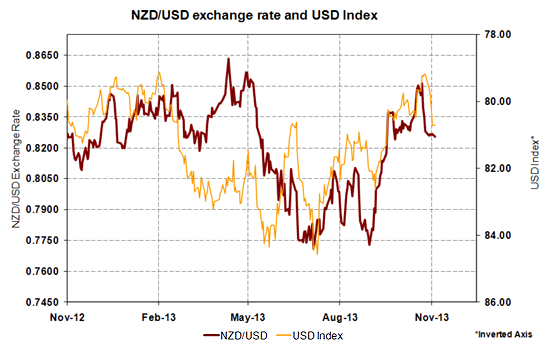
 By Roger J Kerr
By Roger J Kerr
As anticipated, the EUR/USD exchange rate could not sustain the crazy levels above $1.3800 last week and the Euro has reversed engines to fall to $1.3480.
High unemployment and low inflation in Europe, coupled with Ben Bernanke not being as negative on the US economy as some thought have been behind the improvement in the USD in global currency markets.
Therefore, it is no surprise that the Kiwi has recoiled sharply from above 0.8500 to trade as low as 0.8210 last week.
The USD Index has bounced up from 79.50 to 80.70 as the financial markets start to look forward at underlying economic realities between the US and Europe and thus conclude that a weaker USD makes no sense.
Maybe a weaker USD was justified following the September “no tapering” decision by the Fed and the October US fiscal shenanigans, however we are now well past those events and the “go forward” scenario is continuing USD strength based on superior economic performance.
Commodity prices continue to fall, despite stronger Chinese PMI data over the weekend.
The Australian dollar still has some catching up to do to the lower metal and mining prices over recent weeks. The CRB Commodities Index has dropped well below 280 to 275, mainly due to lower oil prices.
Last week’s OCR review statement from the RBNZ did not provide any real fresh information to the FX markets, with the RBNX really re-stating the obvious.
The focus this week will be on NZ employment figures on Wednesday, Aussie retail sales/employment data and then US non-farm payrolls for the distorted month of October (partial Government shut-down) on Friday night.
We also have the possibility of the European monetary authorities, the ECB providing more of a stronger hint of cutting interest rates further (Thursday night our time) as rising unemployment and low inflation steers them to further stimulus action.
The Euro is set to weaken further, which should drag the Kiwi down to the 0.8000/0.8100 area over coming weeks.
On previous occasions over the last 12 months when the USD Index has strengthened to 84.0, the Kiwi dollar has ultimately followed and weakened well below 0.8000 (see chart below).

-----------------------------------------------------------
To subscribe to our daily Currency Rate Sheet email, enter your email address here.
No chart with that title exists.
Roger J Kerr is a partner at PwC. He specialises in fixed interest securities and is a commentator on economics and markets. More commentary and useful information on fixed interest investing can be found at rogeradvice.com
2 Comments
Can't waste any more time looking back at these totally, and consistantly, wrong assertions regarding NZ$ value. But why do interest co publih them???????
what wrong assertions?
"On previous occasions over the last 12 months when the USD Index has strengthened to 84.0, the Kiwi dollar has ultimately followed and weakened well below 0.8000 (see chart below)."
Tha's a statement of past fact, not an assertion of the future. As a predictor of the future it did pretty good, the rate dropped from a high of .85 down to .81 by the end of Nov, and again down to .80 by the end of Jan.

We welcome your comments below. If you are not already registered, please register to comment
Remember we welcome robust, respectful and insightful debate. We don't welcome abusive or defamatory comments and will de-register those repeatedly making such comments. Our current comment policy is here.